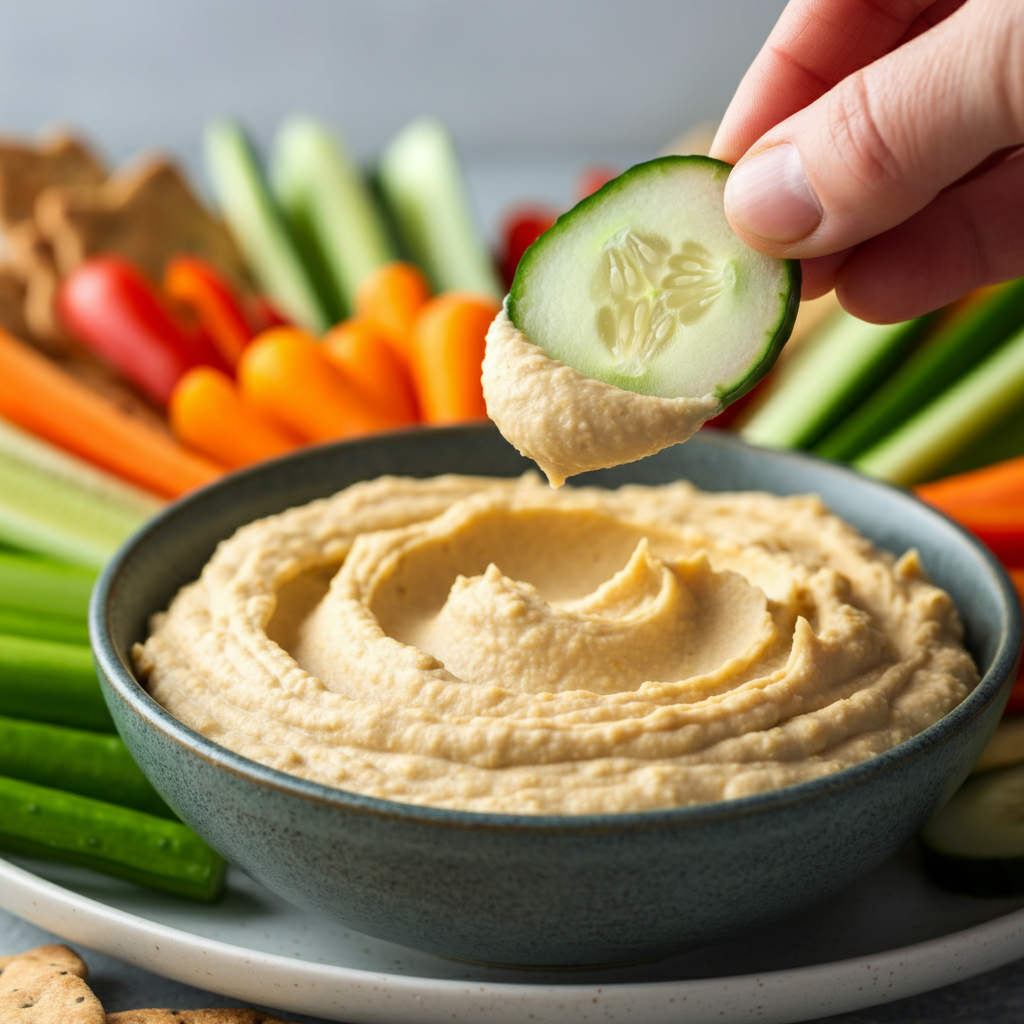Hummus has become a staple in many households. It’s the perfect snack, dip, or even a spread—smooth, creamy, and downright delicious. But if you’re on a gluten-free diet, you might be left scratching your head, wondering, “Wait, is hummus gluten free, or am I unknowingly indulging in something that could upset my stomach?” 🤔 The good news? We’re taking a deep dive into this question. Together, we’ll explore its origins, ingredients, and whether or not you need to tread carefully when indulging in this Middle Eastern classic.
What Is Hummus? A Brief Overview
To put it simply, hummus is a thick, flavorful dip that’s often made from smashed chickpeas, tahini (a paste made from sesame seeds), lemon juice, garlic, and olive oil. While it might sound simple, the result is pure magic. It’s rich, nutty, and has that creamy texture we all love. Plus, it pairs just as well with crispy vegetables 🌽🥕 as it does with pita bread.
Think of hummus as the blank canvas of dips—it can be simple or spiced up with things like roasted red peppers, pine nuts, or even caramelized onions.
“Hummus isn’t just food; it’s an experience—a tiny taste of tradition, history, and comfort all in one bite.”
But here’s where curiosity starts to bubble up. If you’re someone who has to look out for gluten—whether due to celiac disease, gluten intolerance, or personal preference—it’s no longer just about taste. Complications like cross-contamination or hidden ingredients can sneak in.
Before you panic about what’s in your favorite tub of hummus, let’s explore where it comes from and what makes it so deliciously unique.
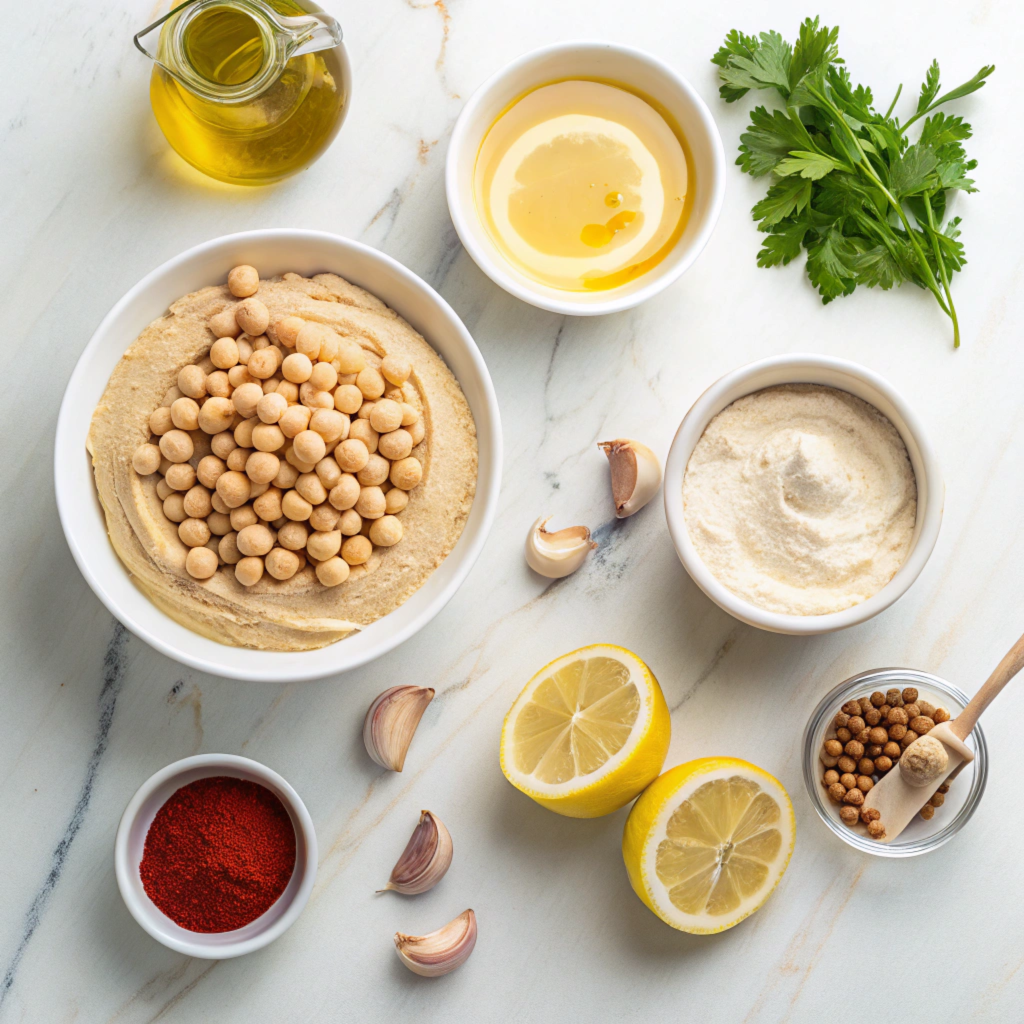 The Origins and Ingredients of Hummus
The Origins and Ingredients of Hummus
Hummus is deeply rooted in Middle Eastern culture, where it’s been enjoyed for centuries. The word “hummus” itself means “chickpea” in Arabic, which shows just how central these legumes are to the dish. Over time, hummus has transcended its cultural boundaries, becoming a beloved snack worldwide. But even as it gains popularity, its traditional ingredients remain the same.
Now, what exactly goes into hummus? Well, at its core, it’s made up of the following:
The Must-Have Ingredients:
- Chickpeas – The heart and soul of hummus. Packed with protein, fiber, and a mild nutty flavor.
- Tahini – Think of it as peanut butter’s sesame cousin. It adds depth and creaminess.
- Garlic – A small but mighty ingredient that brings a flavorful punch.
- Lemon Juice – This gives hummus its tangy kick.
- Olive Oil – Silky smooth and full of healthy fats.
Notice anything missing? No flour. No gluten. On paper, hummus in its most basic form is naturally gluten-free—and that’s great news! 🎉 But as we’ll discuss later, things can get tricky with how it’s made or where it’s sourced.
Why the Ingredients Matter
Chickpeas and tahini aren’t just the stars of hummus; they’ve also been hailed as superfoods. Chickpeas come with benefits like keeping you full and giving you a steady boost of energy—kinda like the tortoise in that tortoise and hare story. They’re slow, steady, and reliable. Fancy that for your nutrition!
Tahini, meanwhile, is full of essential vitamins and minerals like magnesium and phosphorus. It’s also a dairy-free hero in case you’re juggling multiple dietary preferences.
Why Gluten Matters for Some Diets
You’re probably familiar with gluten—it’s what gives bread that irresistibly chewy texture. But for some, it’s not so charming. Gluten is a protein found in wheat, barley, and rye, and while many of us digest it just fine, others can’t.
For those with celiac disease—a serious autoimmune condition—gluten triggers an immune response that damages the small intestine. Even trace amounts can be enough to cause distress. Similarly, people with gluten intolerance might not face the same internal damage but can still experience bloating, cramps, or fatigue after eating gluten-containing foods.
“Navigating a gluten-free diet can feel like walking through a culinary minefield, but with knowledge comes confidence.”
If you’re in one of these groups, you already know how crucial it is to scrutinize labels and ask questions—because sometimes, gluten can sneak into foods you’d never expect. Even something simple like hummus can have hidden risks, which we’ll explore as we go deeper. 🕵️♂️
But for now, breathe easy. By the time we’re done, you won’t just know whether hummus is gluten-free. You’ll be armed with the tools to spot potential pitfalls, choose gluten-free options confidently, and maybe even whip up your own perfect hummus at home. 😌
Does Traditional Hummus Contain Gluten?
Here’s the short answer to the million-dollar question: traditional hummus doesn’t contain gluten. 🎉 That’s because, at its purest form, hummus sticks to its classic lineup—chickpeas, tahini, lemon juice, garlic, and olive oil. None of these ingredients naturally contain gluten, which is excellent news for those maintaining a gluten-free diet.
But (and there’s always a “but,” isn’t there?) life is rarely that straightforward. While traditional hummus recipes are safe, not everything labeled as “hummus” follows the conventional formula. Sometimes, processed varieties may include add-ins, flavorings, or thickeners that unexpectedly contain gluten. For example:
- Some brands use fillers or starches to tweak the texture, and these might sneak in gluten.
- The spices or seasoning blends used in flavored hummus—think “everything bagel” or “pizza hummus”— might contain traces of gluten.
- Cross-contamination is a real concern, especially if it’s made in a facility that also processes wheat products. Even a tiny crumb can cause problems for those with gluten sensitivities.
“When it comes to store-bought hummus, what you see isn’t always what you’ll get. A quick glance at the label can save you from surprises at snack time.” 🛑
Now that we’ve cleared that up, let’s tackle something even more personal—should you go store-bought or homemade?
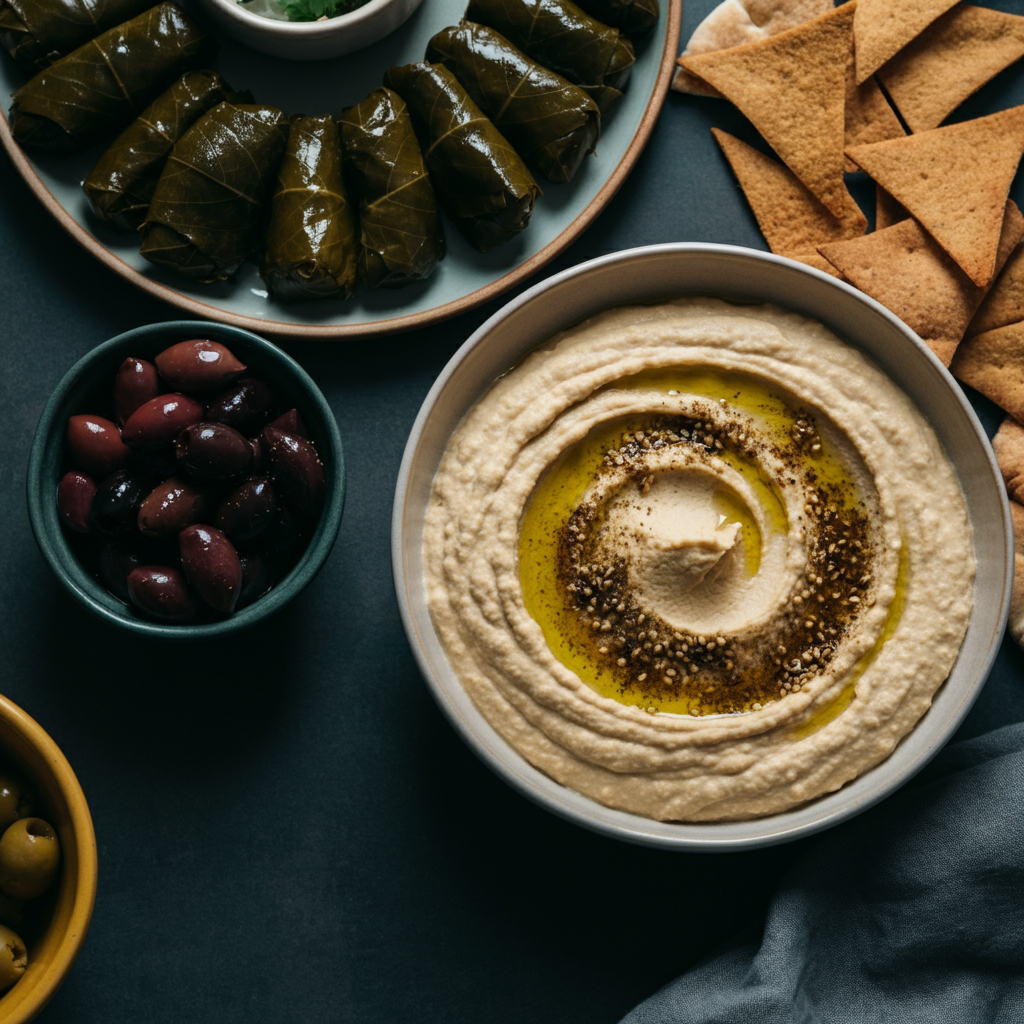 Store-Bought vs. Homemade Hummus
Store-Bought vs. Homemade Hummus
When it comes to hummus, we really have to ask ourselves, “Is convenience worth the risk?” Store-bought hummus is undeniably convenient. You can just grab it from the fridge, tear off the lid, and voilà—you’re ready to dip your carrots or chips. But if you’re someone who’s sensitive to gluten, you might find yourself staring at the back of the grocery store tub like a detective, searching for any hint of mystery ingredients. 😅
Gluten Risks in Commercially Produced Hummus
While many major brands are careful about labeling, some risks are harder to spot:
- Cross-Contamination – Even if a product claims to be gluten-free, it could be made in the same factory as gluten-containing foods. This is especially true for smaller or less transparent companies.
- Flavored Hummus – Ah, the double-edged sword of variety. While adventurous flavors are tempting, the added ingredients may bring gluten into the mix.
- Questionable Additives – Stabilizers or preservatives, often used in mass production, are sometimes derived from gluten-containing grains.
Ensuring Gluten-Free Hummus at Home
Here’s the magic trick for avoiding all these problems—make your own hummus. 🎩✨ It’s shockingly easy, requires minimal ingredients, and takes less time than waiting in the checkout line. By preparing hummus at home, you’re the one in charge of what goes in (and what doesn’t).
Think of homemade hummus as your blank canvas; you can jazz it up with roasted peppers, sprinkle in some cumin, or even add a spoonful of sun-dried tomatoes. Best of all, you’ll never have to wonder, “Hmm, what’s really in this?” because you already know. It’s like turning your kitchen into your very own gluten-free sanctuary. 🏡
“Homemade hummus isn’t just about taste—it’s about trust, peace of mind, and the satisfaction of knowing exactly what you’re putting on your plate.”
Now, while all of this sounds simple enough, you might still have some lingering questions. Don’t worry, I’ve got you covered!
Common Problems and Questions
Even the most well-meaning hummus lovers often run into a few hiccups—or at least have burning questions. Don’t these sound familiar?
“Can I Trust ‘Gluten-Free’ Labels?”
It’s easy to feel a false sense of security when you see “gluten-free” slapped on a product. But here’s the catch—not all certifications are created equal. Bigger brands that are regulated following strict standards are usually trustworthy, but smaller companies might fudge the label (or just mislabel entirely). If a product has the certified gluten-free seal, that’s always a great sign.
When in doubt, reach out to the manufacturer. Many brands have customer service teams ready to answer your questions about their gluten practices. Sure, it might seem extra, but isn’t your comfort worth a quick email or a phone call?
“Always remember, the best label is the one you can trust without a shadow of a doubt.”
“What About Flavored or Specialty Hummus?”
Who doesn’t love the thrill of trying bold, new hummus flavors? Whether it’s “spicy chili,” “basil pesto,” or even “chocolate hummus,” these creative spins have made hummus a fun and versatile option. But novelty often comes with strings attached—i.e., risky added ingredients. Flavored hummus blends are the usual suspects for hidden gluten, either through seasoning mixes or subtle thickeners.
The solution? If you can’t find a trusted gluten-free option in the flavor you love, consider making your own flavored hummus. All you need is a blender and a spark of creativity. 🤯 No factory-made risks, just pure, unadulterated deliciousness.
“Can Restaurants Serve Safe Hummus?”
Dining out with dietary restrictions often feels like a game of 20 Questions, doesn’t it? If you’re wondering about hummus in restaurants, your best bet is to ask about how it’s prepared. Is it made on-site or bought pre-packaged? Do they use any non-traditional ingredients? And perhaps most importantly, is the preparation area shared with gluten-containing foods?
Don’t be afraid to ask questions. Most servers and chefs are happy to help, especially if it means accommodating your dietary needs. Confidence and clarity are key to eating out safely.
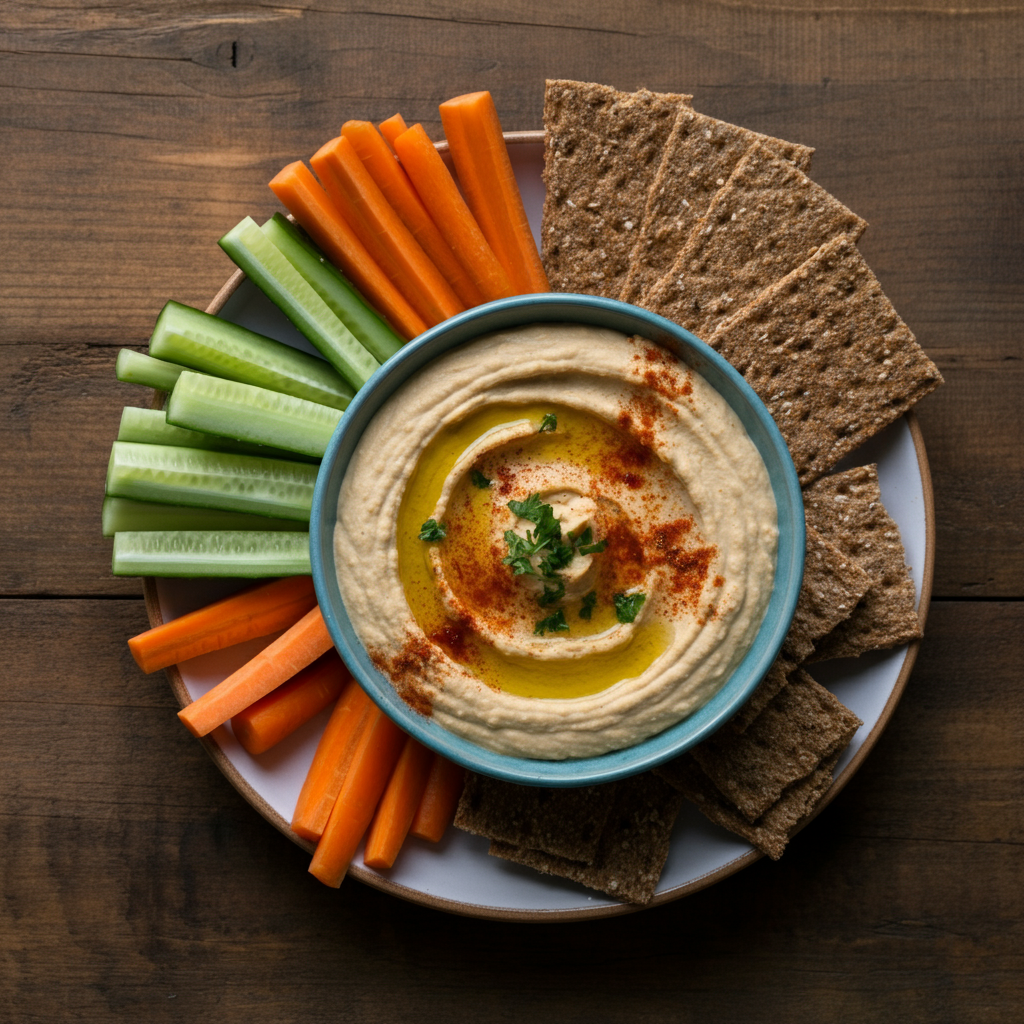 How to Verify Gluten-Free Hummus
How to Verify Gluten-Free Hummus
Navigating the world of gluten-free eating may feel like a detective mission sometimes, but thankfully, verifying whether your hummus is safe doesn’t require a magnifying glass or trench coat. 🕵️ First off, always read the label. Look for those magic words, “certified gluten-free”—it’s not just a marketing term, but a trusted indicator of rigorous testing and standards.
Reading Labels and Packaging
Pay attention to both the ingredients and any “may contain” warnings listed on the packaging. Manufacturers are required to disclose if their products could potentially come into contact with allergens like wheat during production. If you see phrases like “made in a facility that processes wheat,” treat it as a yellow light—proceed with caution.
But here’s a hot tip for peace of mind—stick with brands known for their transparency. These companies often go the extra mile to provide allergen-safe products for their customers. And when there’s any doubt? Call or email their customer service team for clarification. It may sound like a hassle, but your next delicious scoop of hummus is worth it. 🥄✨
Asking Questions at Restaurants
Dining out can feel like uncharted waters for those avoiding gluten. However, don’t hesitate to pepper your server or chef with questions about their hummus. Ask if it’s made in-house or pre-purchased and whether they use any risky additives like flour or starch. Most staff members will appreciate your proactive communication, especially if it means avoiding an unnecessary health issue.
“There’s no such thing as being too careful when it comes to your health. Asking questions isn’t rude—it’s responsible.”
Now, are store-bought options good to go? Read on to explore some trusted brands!
Gluten-Free Hummus Brands to Consider
When shopping for hummus, not all brands are created equal. Some remain vigilant about gluten-free production, while others may… well, cut corners. 😬 Sticking with credible brands can save you from unexpected surprises.
Popular and Trusted Options
Here are a few brands that have captured the trust of gluten-free enthusiasts:
- Sabra – With clear labeling and wide availability, Sabra is a go-to for many hummus lovers. Most of their products are gluten-free, but always double-check specific flavors.
- Cedar’s Mediterranean Foods – This brand offers a certified gluten-free option with an array of classic and fun flavors.
- Hope Foods – Known for organic and clean ingredients, Hope Foods’ hummus varieties are loved for their smooth texture and attention to food safety.
- Tribe Hummus – Another widely available brand that’s easy to find and trustworthy for gluten-sensitive individuals.
How to Choose Safely
When browsing hummus varieties, it’s easy to feel overwhelmed by the sheer number of choices. The best strategy? Start with plain or traditional flavors, which are less likely to have added gluten ingredients. Over time, experiment with brands and specialty flavors to find your absolute favorite. Remember, staying safe doesn’t mean boring—it just means mindful exploration. 🧐
Benefits of Eating Gluten-Free Hummus
If you’ve been worrying about whether hummus can stay on your menu, here’s some comfort food for thought. Not only is gluten-free hummus safe for many diets, but it’s also packed with benefits that make it an all-around nutritional superstar.
Nutritional Benefits
Hummus is a plant-based powerhouse. Packed with protein from chickpeas, healthy fats from tahini and olive oil, plus fiber to keep your digestion happy, it’s the kind of snack that checks all the boxes. ✅ Think of it like a reliable friend—one that keeps you full, energized, and guilt-free all day long. Whether you’re gluten-free or not, hummus is a wonderful addition to nearly any lifestyle.
And the health perks don’t stop there! It’s naturally low in cholesterol, supports heart health, and keeps your sugar levels steady. Oh, and it’s a great source of folate, magnesium, and iron—what’s not to love? 🧡
Supporting a Gluten-Free Lifestyle
One of the joys of living gluten-free is discovering how adaptable your favorite recipes and snacks can be. Hummus is an excellent example of a naturally adaptable option. Pair it with gluten-free crackers or veggie sticks, and you have a snack so versatile it could be your best-kept nutrition secret.
“Hummus reminds us that life without gluten doesn’t mean life without flavor. It’s proof that wholesome eats can still be indulgent.”
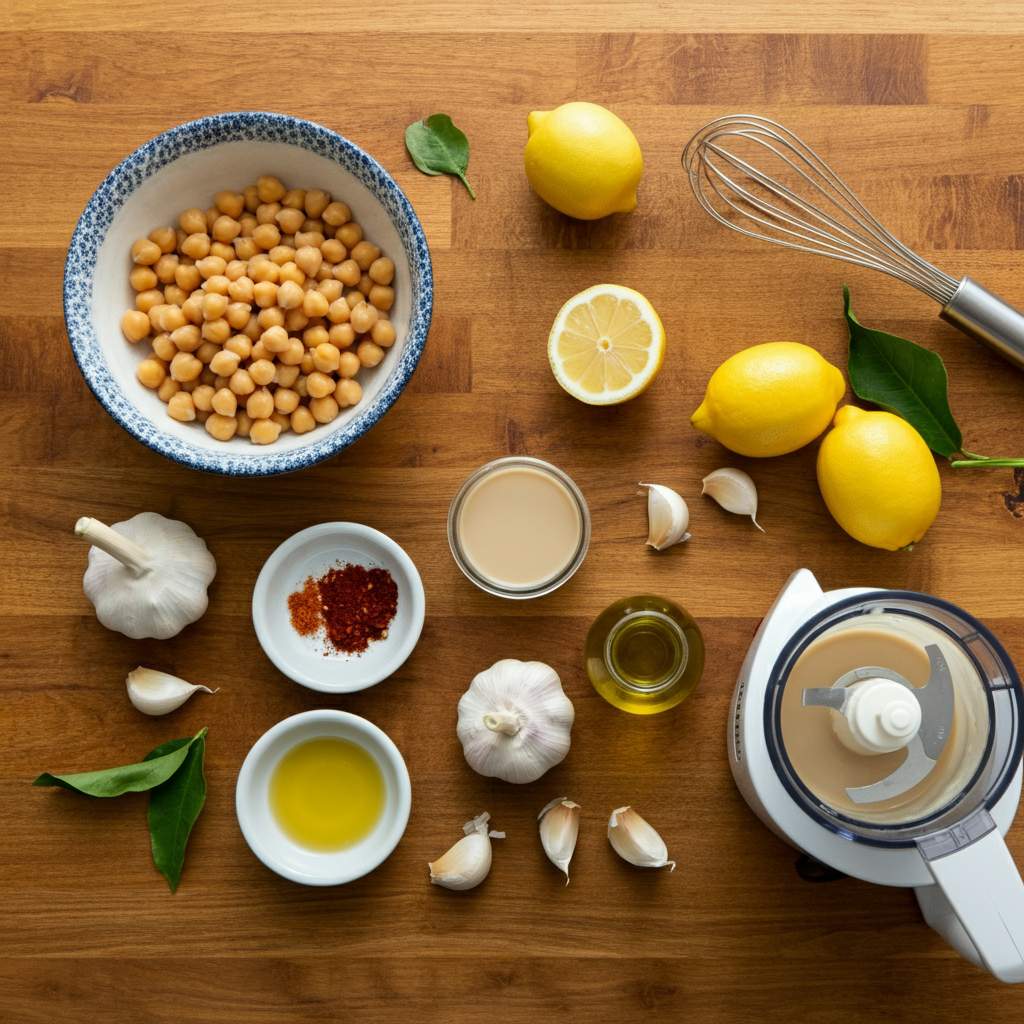 Simple Homemade Gluten-Free Hummus Recipe
Simple Homemade Gluten-Free Hummus Recipe
If you’re someone who adores personalizing recipes or just wants more control over what goes in their food, making hummus at home is the way to go. Best of all? It’s super simple and requires minimal effort. Let’s roll up our sleeves!
Ingredients You’ll Need:
- 1 can (15 oz) chickpeas (rinsed and drained)
- 3 tablespoons tahini
- 2 tablespoons olive oil, plus a drizzle for garnish
- 2 cloves garlic, minced (or roasted for extra flavor!)
- 2-3 tablespoons lemon juice (freshly squeezed is best🍋)
- Salt to taste
- (Optional) Sprinkle of paprika or chopped parsley for garnish
Step-by-Step Preparation:
- Prep Your Blender or Food Processor: This baby is about to do all the heavy lifting for you.
- Add Chickpeas: Pour them in and get ready to transform those plain legumes into creamy magic.
- Toss in the Tahini, Lemon Juice, and Garlic: These are the MVPs of flavor in your hummus—don’t skimp!
- Blend While You Drizzle: With the food processor going, slowly add the olive oil until you reach your desired creamy consistency. Add a little water if it’s too thick.
- Taste and Adjust: Fancy a tangier kick? Add a squeeze more lemon. Need a bit of heat? Toss in a pinch of chili powder. It’s your hummus, your rules.
- Serve and Garnish: Scoop the hummus into a bowl, drizzle with that extra olive oil, and sprinkle with paprika or parsley for a pop of color. Bonus points if you serve it with warm gluten-free pita bread or crunchy carrots.
It’s smooth, flavorful, and, here’s the kicker—totally gluten-free. 🎉 Homemade hummus proves that good food doesn’t have to be complicated or risky.
Final Thoughts on Hummus and Gluten-Free Living
Navigating through gluten-free living doesn’t have to feel like a chore, and hummus is here to prove it. Whether you opt for store-bought brands, whip up your own recipes, or explore every flavor under the sun, this creamy classic ensures snacking and mealtime remain vibrant and worry-free.
“At the end of the day, eating gluten-free is about more than avoiding health risks—it’s about savoring the little joys in life, one delicious bite at a time.” 🥰
What flavors will you try next? The hummus world is full of possibilities—dive in and discover your favorite! 🌟

